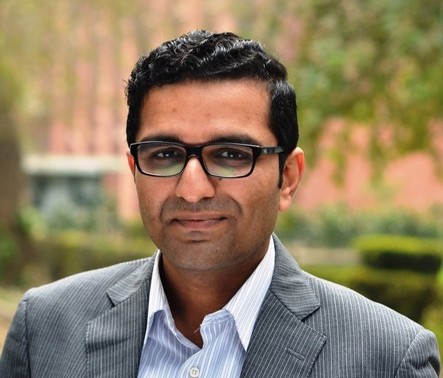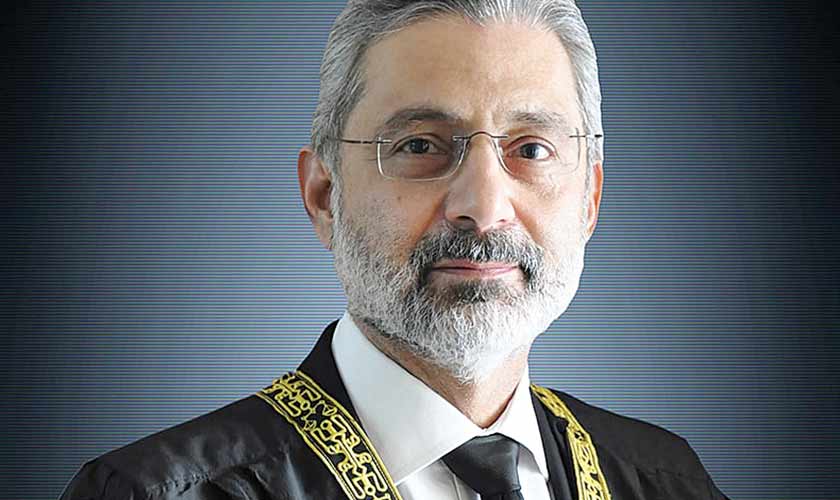
Pakistan flag | Canva.
Yaqoob Khan Bangash is a historian of Modern South Asia and a current Fulbright Fellow at the Mittal Institute (read our Q&A with Dr. Bangash). He is also the coordinator of the upcoming event, “The Pakistan Conference: 75 Years of Independence,” November 29-30 at CGIS South.
The conference aims to bring a focused, though not exclusionary, lens to the study of the country and its 75 years since independence. It will provide the space to reflect upon the past, but also explore the lingering legacies and challenges that continue to cast a shadow over the country. We spoke with Yaqoob about his motivations behind the conference, and what attendees can expect.

Yaqoob Khan Bangash.
Mittal Institute: Yaqoob, you are no stranger to event organizing, having spearheaded the Afkar-e-Taza ThinkFest since its inception in 2016. What motivated you to organize this conference on Pakistan’s journey since independence?
Yaqoob Khan Bangash: In 2022, Pakistan completed 75 years of independence and so the timing is right to ‘take stock’ of this long duration. Also, there had not been an exclusive conference on Pakistan at the Mittal Institute (and indeed Harvard) for years, and so it was about time that a corrective was made. Furthermore, research on Pakistan has flourished in recent years, with hundreds now doing Ph.D’s on Pakistan related topics around the world. Thus, we wanted to create an event where younger scholars could come and engage with each other and senior scholars, so as to further develop and learn.
We wanted to create an event where younger scholars could come an engage with each other and senior scholars, so as to further develop and learn.
Mittal Institute: Conferences of this scale are always a collaborative effort. Can you shed light on how this conference came together?
Yaqoob Khan Bangash: Yes! A conference can never be a singular task and there is always a large cast without whom the event simply would not happen. For this event, as with everything at the Mittal Institute, Executive Director Hitesh’s support was key. Not only did he immediately endorse the idea, the ease with which he agreed to the seed funding made it possible to actually initiate the event (and made me wonder if I should have asked for more money!). Then during an informal conversation, Professor Parimal Patil, Chair of the South Asian Studies Department, offered his department’s support which was simply amazing and exhibited the cross departmental support for and confidence in the conference. Professor Patil’s advice has been key in maneuvering several tricky situations since, for which I am very grateful.
With the financial base for the conference established, I contacted Professor Asim Khwaja at the Harvard Kennedy School to help conceptualise the conference. His advice to focus on early career scholars shaped the call for papers and later the selection process, so that we are able to not only hear from newer and younger scholars, but enable the development of networks which would continue to create new knowledge and conversations.
I was also lucky that Professor Hassan Abbas from the National Defence University in Washington DC was happy to collaborate, especially by agreeing to formulate a panel on extremism and internal security—two key challenges for Pakistan. Professor Abbas is a world expert on these themes and his panel is one of the highlights of the conference.
The conference also received support from the American Institute for Pakistan Studies (AIPS), where the help and guidance of its president, Professor Matthew Cook was indispensable. AIPS is the largest organization in the U.S focusing on Pakistan and it was great to be able to work with them. I really hope that this is the start of a long relationship of collaboration between AIPS and the Mittal Institute. Most of the AIPS grant has been used towards giving bursaries to graduate students, and so we are truly grateful for it.
The conference review team, which included at the Mittal Institute the Bajaj Fellow Dr. Khyati Tripathi, the Ragunathan Fellow, Dr. Ajmal Areethala, and Visiting Fellows, Professor Ian Talbot and Dr. Tania Saeed, together with Professor Anita Weiss from the University of Oregon and Dr. Pippa Virdee from De Montfort University UK, deserves accolades. Not only did they review a record number of submissions—178!—they did it in a timely fashion, and endured several rounds of the selection process meetings.
Finally, the Mittal Institute team has helped and are continuing to help with several aspects of the conference.
So, indeed, it is a large cast which is making this event possible and I am truly thankful for all their continued efforts and support.
Mittal Institute: Your call for papers focuses on a broad range of themes, from the legacy of Partition; to impact of climate change; to interrogating questions of identity and Islam; to much more. How did you devise this list of topics, and are there any that you anticipate the conference will focus on more?
Yaqoob Khan Bangash: Hosting a general conference is always hard as there are far more important themes than slots! However, from our side, we did suggest a few critical themes, so that a broad understanding of Pakistan might be developed. Of course, the papers proposals we received increased the range of themes far beyond what we suggested and so it was really hard to select papers.
In the end, dozens of really good proposals could not be accepted mainly due to the fact that we wanted to give more space to early career researchers, and the contingencies of time and availability, but we hope to do a Pakistan leg of this conference in the future in order to increase inclusivity and participation. Thus, there are several key themes missing from the conference, which we hope to cover later on.
Mittal Institute: There is a special keynote for the conference. Could you tell us more about him?
Yaqoob Khan Bangash: The Honourable Mr. Justice Qazi Faez Isa, the Senior Puisne judge of the Supreme Court of Pakistan, is the special keynote for the conference. I requested Justice Isa to especially come from Islamabad for this conference because I believe that questions about the rule of law, constitutionalism and rights are the fundamental issues of Pakistan, today, as they were in the past, and will remain so in the future. Pakistan is a country obsessed with the law—even dictators want their legitimacy through the courts, and yet, Pakistan is at the bottom of the rule of law index. The solution to this paradox is, I believe, key to Pakistan’s future.

The Honourable Mr Justice Qazi Faez Isa, the Senior Puisne judge of the Supreme Court of Pakistan, will deliver the conference keynote.
Justice Isa is therefore an ideal person to comment on the themes above. Not only is he a jurist of note, with several landmark judgements to his credit, his experience as the Chief Justice of Balochistan—Pakistan’s most restive province, and his future role as the Chief Justice of Pakistan in 2023, distinguish him even further. He also comes from a lineage which seamlessly connects with Pakistan’s past, where his father Qazi Isa, was the founder of the Muslim League in Balochistan and a stalwart of the Pakistan Movement.
Mittal Institute: As Pakistan looks to the future, what do you personally see as the most important things the country should focus on?
Yaqoob Khan Bangash: In a way, the proposals for the conference have shown the way for the future. Together with the lingering effects of the partition, and the still unsettled questions of religion and state, climate change and urban issues are going to be at the forefront, as exhibited by the panels. With three-quarters of Pakistan’s population being young, education is also a critical theme, on which we also have a solid panel in the conference. The rise of new media, continued challenges of extremism and the rule of law, and the developing geo-political environment around the world, are all larger issues which will continue to impact Pakistan and the world, and questions we will grapple with during the conference.
Mittal Institute: A goal of the conference was to gather interdisciplinary research across multiple genres. How do you hope to build upon this cross-disciplinary collaboration, after the conference?
Yaqoob Khan Bangash: We do not want the conversation to end with the last session of the conference. In fact, we hope that it would have just begun and will continue in different combinations in the weeks and months ahead. Therefore, we are planning that in the months to follow we will publish several papers from the conference as an edited volume examining the 75 years of Pakistan. We will also endeavour that the networks established are aided, either formally or informally, so that solid academic work on Pakistan continues to be developed, engaged with and published.
